Related Research Articles

Federico Fellini was an Italian film director and screenwriter. He is known for his distinctive style, which blends fantasy and baroque images with earthiness. He is recognized as one of the greatest and most influential filmmakers of all time. His films have ranked highly in critical polls such as that of Cahiers du Cinéma and Sight & Sound, which lists his 1963 film 8+1⁄2 as the 10th-greatest film.
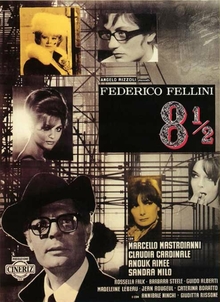
8½ is a 1963 comedy drama film co-written and directed by Federico Fellini. The metafictional narrative centers on Guido Anselmi, a famous Italian film director who suffers from stifled creativity as he attempts to direct an epic science fiction film. Claudia Cardinale, Anouk Aimée, Sandra Milo, Rossella Falk, Barbara Steele, and Eddra Gale portray the various women in Guido's life. The film was shot in black and white by cinematographer Gianni Di Venanzo and features a score by Nino Rota, with costume and set designs by Piero Gherardi.
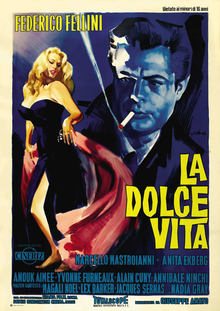
La dolce vita is a 1960 satirical comedy-drama film directed by Federico Fellini. It was written by Fellini, Ennio Flaiano, Tullio Pinelli, and Brunello Rondi. The film stars Marcello Mastroianni as Marcello Rubini, a tabloid journalist who, over seven days and nights, journeys through the "sweet life" of Rome in a fruitless search for love and happiness. The screenplay can be divided into a prologue, seven major episodes interrupted by an intermezzo, and an epilogue, according to the most common interpretation.

Giulia Anna "Giulietta" Masina was an Italian film actress best known for her performances as Gelsomina in La Strada (1954) and Cabiria in Nights of Cabiria (1957), for which she won the Cannes Film Festival Award for Best Actress at the 1957 Cannes Film Festival.

La strada is a 1954 Italian drama film directed by Federico Fellini and co-written by Fellini, Tullio Pinelli and Ennio Flaiano. The film tells the story of Gelsomina, a simple-minded young woman bought from her mother by Zampanò, a brutish strongman who takes her with him on the road.

I vitelloni is a 1953 Italian comedy drama film directed by Federico Fellini from a screenplay written by himself, Ennio Flaiano and Tullio Pinelli. It stars Franco Interlenghi, Alberto Sordi, Franco Fabrizi, Leopoldo Trieste, and Riccardo Fellini as five young Italian men at crucial turning points in their small town lives. Recognized as a pivotal work in the director's artistic evolution, the film has distinct autobiographical elements that mirror important societal changes in 1950s Italy.
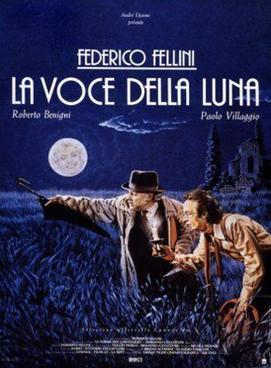
The Voice of the Moon is a 1990 Italian dramatic comedy film directed and written by Federico Fellini and starring Roberto Benigni, Paolo Villaggio, and Nadia Ottaviani. Based on the novel Il poema dei lunatici by Ermano Cavazzoni, and revisiting themes Fellini first explored in La strada (1954), the film is about a fake inspector of wells and a former prefect who wander through the Emilia-Romagna countryside of Fellini's childhood and discover a dystopia of television commercials, fascism, beauty pageants, rock music, Catholicism, and pagan ritual.
Fellini Satyricon, or simply Satyricon, is a 1969 Italian film written and directed by Federico Fellini and loosely based on Petronius's work Satyricon, written during the reign of Emperor Nero and set in Imperial Rome. The film is divided into nine episodes, following Encolpius and his friend Ascyltus as they try to win the heart of a young boy named Gitón within a surreal and dreamlike Roman landscape.
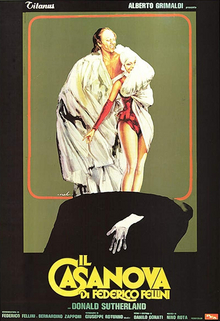
Fellini's Casanova is a 1976 Italian film directed by Federico Fellini from a screenplay he co-wrote with Bernardino Zapponi, adapted from the autobiography of 18th-century Venetian adventurer and writer Giacomo Casanova, played by Donald Sutherland. The film depicts Casanova's life as a journey into sexual abandonment, and his relationship with the "love of his life" Henriette. The narrative presents Casanova's adventures in a detached, methodical fashion, as the respect for which he yearns is constantly undermined by his more basic urges.
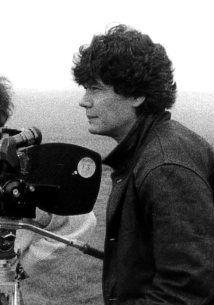
DamianPettigrew (1963) is a Canadian filmmaker, screenwriter, producer, author, and multimedia artist, best known for his cinematic portraits of Balthus, Carolyn Carlson, Federico Fellini, and Jean Giraud.

Tullio Kezich was an Italian screenwriter and playwright, best known as the film critic for Corriere della Sera and for his biography of Italian director Federico Fellini, Federico Fellini: His Life and Work.

Tullio Pinelli was an Italian screenwriter known for his work on the Federico Fellini films I Vitelloni, La Strada, La Dolce Vita and 8½.
I'm a Born Liar: A Fellini Lexicon is a book combining film stills and photographs with transcripts of the last filmed interviews with Federico Fellini conducted by Canadian filmmaker Damian Pettigrew in Rome in 1991 and 1992. The interviews are edited and introduced by Pettigrew with a preface by Italian film critic and Fellini biographer Tullio Kezich.
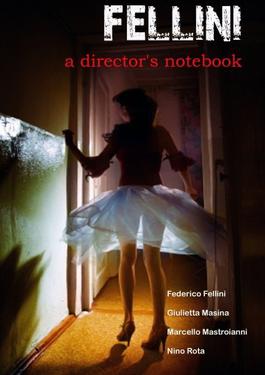
Fellini: A Director's Notebook is an Italian documentary for television directed by Federico Fellini shot in 16mm and first broadcast in the United States on NBC in 1969, on NBC Experiment in Television.
A list of books and essays about Federico Fellini:
Knights of the Desert is a 1942 Italian adventure film directed by Gino Talamo and Osvaldo Valenti. It starred Valenti, Luisa Ferida and Luigi Pavese. The film was based on a novel by Emilio Salgari with a screenplay by Federico Fellini and Vittorio Mussolini, the son of Italy's dictator Benito Mussolini. It was produced by the Rome-based ACI which was run by Vittorio Mussolini. Valenti and Ferida were romantically linked, and co-starred in several films together.

Dina Galli was an Italian actress known for her comic stage roles. Galli also appeared in fourteen films during her career.
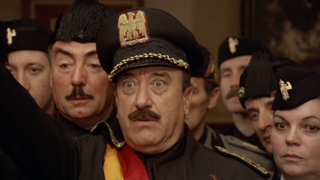
Armando Brancia was an Italian film and television actor.
Luigi Rovere was an Italian film producer.
Federico Fellini: His Life and Work is a biography about the Italian filmmaker Federico Fellini, written by the critic Tullio Kezich. The first version of the book was published in 1987 as Fellini. A revised and expanded version was published in Italian in 2002 and English in 2006.
References
- ↑ Gordon p.112
